In 2014, a scholar with extensive industrial experience arrived in Shenzhen, a hub of innovation. At the School of Advanced Materials, Peking University Shenzhen Graduate School, he dedicated himself to the research and education of organic optoelectronic materials, fostering generations of innovative talent with a distinctive educational philosophy.
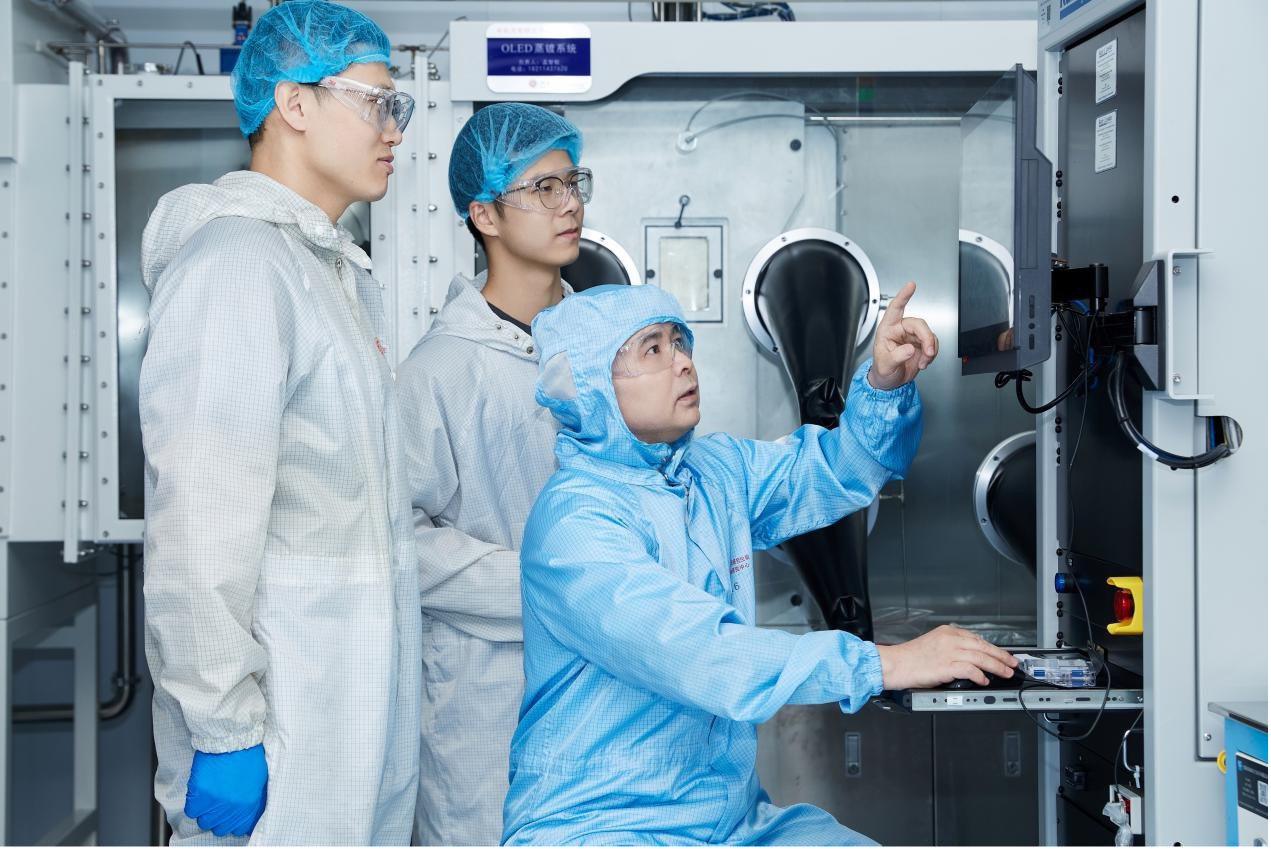
Hong Meng & His Team Members
I. A Cross-Disciplinary Journey: Transformation From Corporate Research & Development to an Educator
In 1988, Hong Meng began his academic journey in the Chemistry Department at Sichuan University, demonstrating a keen insight on materials science. During his master’s studies in organic chemistry at Peking University, he quickly distinguished himself. His pursuit of knowledge led him to the National University of Singapore and the University of California, Los Angeles, positioning him at the forefront of international materials science. At Singapore’s Institute of Materials Research and Engineering (IMRE), Bell Laboratories in the United States, and DuPont’s R&D Center, he spearheaded multiple industrialization projects for organic optoelectronic materials, amassing extensive industry experience.
Yet, Prof. Meng’s ambitions extended beyond industry. In 2014, he resolutely returned to China at Peking University Shenzhen Graduate School, embarking on a new chapter in scientific innovation and education.
Since joining Peking University Shenzhen Graduate School, Prof. Meng has established multiple laboratory platforms. Aligning with national development policies, he has integrated resources from industry and cutting-edge international technologies, focusing on the molecular design and synthesis of organic optoelectronic materials, device development, and industrial applications. His work tackles critical “bottleneck” challenges in the optoelectronic industry, building a world-class technology platform for organic optoelectronic materials.
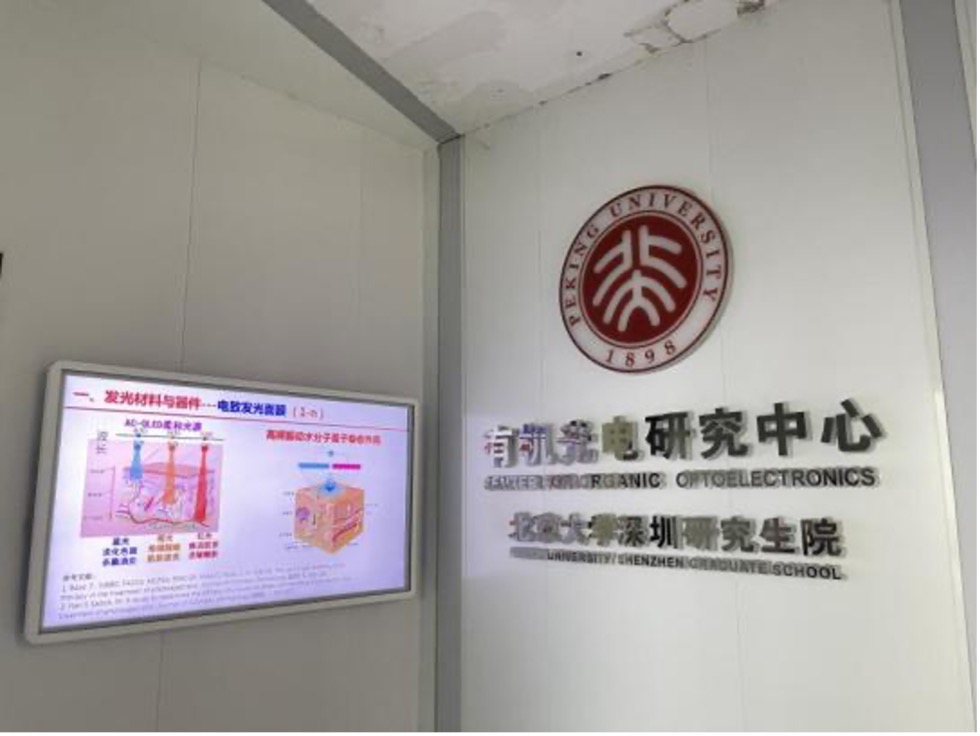
Scientific Achievments
“I spent over a decade deeply engaged in R&D and industrialization in industry, so I understand the immense value of practical experience,” Prof. Meng recalled. “Therefore, when nurturing students, I place great emphasis on developing their practical skills. I encourage them to pursue entrepreneurship or academia in the future, but I particularly hope they engage in practical work before conducting research, combining practical experience with theoretical studies to produce more impactful scientific outcomes.”
Prof. Meng’s educational philosophy can be summarized in three dimensions: height, breadth, and depth. In his view, education is not merely about imparting knowledge but about holistically cultivating students’ comprehensive qualities.
“Height refers to students having a clear understanding of the significance and application value of their research direction,” Prof. Meng explained. “I want my students to adopt a higher perspective, critically examining their research topics and grasping their underlying scientific and societal value.” To this end, he often incorporates historical and contemporary references in his teaching, guiding students to understand their research from a macro perspective and fostering their strategic vision.
“Breadth refers to whether the research direction can be extended to other fields or broader domains,” Prof. Meng continued. He encourages students to stay abreast of the latest advancements in their field while actively seeking crossover with other disciplines, thereby broadening their research horizons and sparking innovative thinking.
“Depth demands that students achieve breakthroughs in innovation, either by exploring uncharted research areas or by delving deeper into existing studies to uncover their scientific essence,” Prof. Meng emphasized. He believes that the essence of scientific research lies in exploring the unknown and pursuing the truth. Therefore, he requires students to possess a solid professional foundation and keen scientific insight, endowing them to continually push their boundaries and achieve innovation in their research.
II. Innovator: Breaking the Tradition of “Textbook as Classroom”
In his teaching methods, Prof. Meng is equally innovative, emphasizing hands-on practice. He recognizes that traditional "rote learning" approaches can no longer meet the demands of cultivating modern scientific research talents. Therefore, he actively explores new pedagogical models, striving to enable students to learn through practice and practice through learning.

Hong Meng’s Classroom
Prof. Meng’s personal qualities are meticulously reflected in his teaching process. Interdisciplinary integration, open-minded thinking, broad knowledge coverage, and the fusion of theory and practice—these are the impressions former students have of Prof. Meng’s courses.
Dr. Meng ingeniously incorporates classic works such as “The Art of War” by Sun Tzu into his classroom teaching. Using the principle of “know yourself and know your enemy,” he guides students to understand the forefront of their research field and assess their own strengths and weaknesses, encouraging them to think actively about combining classical wisdom with practical problems. For instance, when faced with complex experimental data, students apply dialectical thinking from “The Art of War” to analyze the data from multiple perspectives, leading to deeper conclusions. This interdisciplinary teaching approach is refreshing and enlightening for students. They not only acquire professional knowledge but also gain insights into strategic thinking and problem-solving wisdom.
“Simulating international conferences and conducting English group meetings are new teaching methods I’ve implemented in recent years,” Prof. Meng explains. “Through simulated international conferences, students can experience the entire process of academic exchange and enhance their presentation and communication skills. English group meetings help students improve their proficiency in English, laying a solid foundation for future international academic interactions.”
Students trained by Prof. Meng have achieved remarkable success in research institutions, enterprises, and educational fields. One of his students, Jiajun Zhao, shared, “Prof. Meng’s training program has benefited me for life, particularly the rigorous development of my English presentation skills, which enabled me to excel in Huawei’s international projects. Today, I can confidently stand on a global stage, leveraging my expertise and language skills to advocate for Chinese technology, thanks to Prof. Meng’s meticulous guidance and high standards.”
Beyond these innovative educational approaches, Prof. Meng places great importance on textbook development, which reflects his unique teaching style. He views textbooks as critical vehicles for teaching, allowing him to systematize his latest research findings and innovative teaching methods to better guide students’ practical learning. To date, he has published eight textbooks in both Chinese and English, which have not only gained widespread influence in academia but also provided invaluable learning resources for students.
1. Hong Meng, Wei Huang, Flexible Electronic Packaging and Encapsulation Technology, WILEY-VCH, March 2024, ISBN: 978-3-527-35359-0, 384.
2. Hong Meng, Perovskite Light Emitting Diodes: Materials and Devices, WILEY-VCH, 29 December 2023, 9783527844951.
3. Hong Meng, Colloidal Quantum Dot Light Emitting Diodes, WILEY-VCH, 13 October 2023, ISBN: 9783527845149.
4. Hong Meng, Organic Electrochromic Materials and Devices, Peking University Press, 01 September 2022, ISBN: 9787301334010.
5. Hong Meng, Perovskite Luminescent Materials and Devices, Peking University Press, 01 September 2022, ISBN: 9787301333136.
6. Hong Meng, Colloidal Quantum Dot Luminescent Materials and Devices, Peking University Press, 01 September 2022, ISBN: 9787301333525.
7. Hong Meng, Organic Electronics for Electrochromic Materials and Devices, WILEY-VCH, 9 April 2021, ISBN: 9783527830633.
8. Hong Meng, Huang Wei, Organic Thin-Film Transistor Materials, Devices, and Applications, Science Press, 01 November 2019, ISBN: 9787030584861.
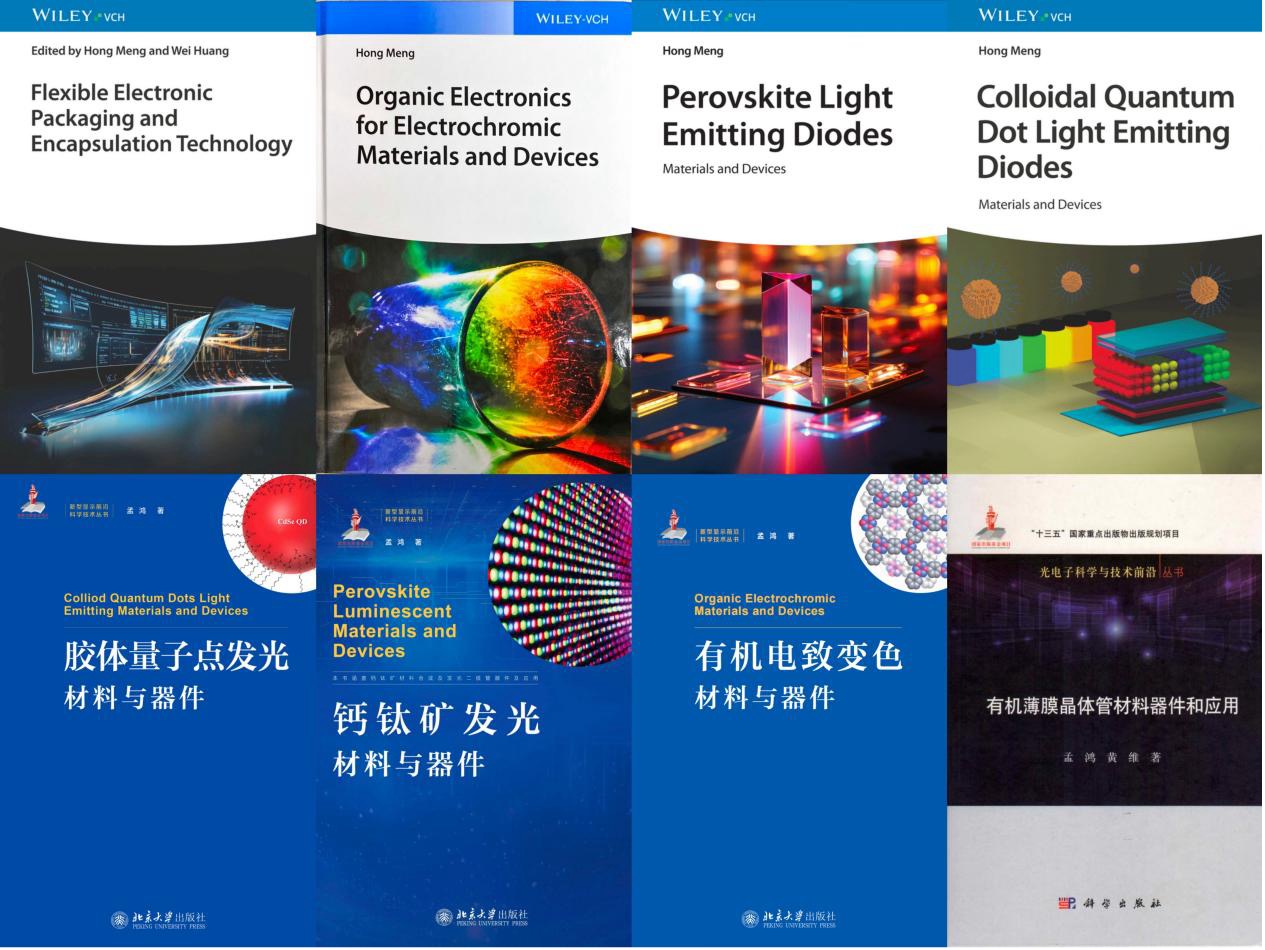
Publications by Hong Meng
Under the wave of the times,Prof. Meng keeps pace with the forefront of technology and plans to launch a new course titled “AI-Enabled Design and Synthesis of Organic Optoelectronic Materials.” This course is rooted in cutting-edge interdisciplinary fields, with the aim of exploring the innovative applications of artificial intelligence in organic optoelectronic materials. It is designed to equip students with the ability to use AI tools to address practical challenges in materials research and development. Through this course, students will learn to leverage machine learning algorithms to accelerate material discovery, optimize synthesis pathways, and predict material performance.
One of Prof. Meng’s former doctoral students remarked, “Prof. Meng’s thinking is remarkably divergent. Often, while discussing one topic, he seamlessly branches out to other areas of knowledge. This is a skill we aspire to master. Divergent thinking unleashes human imagination, breaks free from conventional knowledge boundaries, radiates outward in all directions, and recombines knowledge and ideas to uncover new possibilities, answers, or methods.”
III. Believer: Guided by the Spirit of the Party in Scientific Research
Throughout Prof. Meng’s career in research and education, the spirit of the Communist Party has been a constant source of motivation and guidance. Growing up under the Party’s care, Prof. Meng developed a deep affinity for it. During his university years, he submitted an application to join the Party, though it was not approved at the time. After studying abroad, he felt an even stronger desire to align with the Party, holding himself to higher standards to better serve the nation and its people.
“The Party’s spirit has strengthened my resolve in both my research direction and educational philosophy,” Prof. Meng recalled. Upon returning to China, he received steadfast support from higher authorities, particularly from Mr. Wenchang Tan, the Party Secretary of Peking University Shenzhen Graduate School, whose influence inspired him. Encouraged by Tan’s guidance, Prof. Meng felt the warmth and strength of the Party organization and resolutely submitted his application to join, embarking on a new chapter in his life.
The process of joining the Party was filled with unforgettable moments for Prof. Meng. Participating in Party meetings and collective study sessions deepened his appreciation of the Party’s cohesion and resilience. The moment of taking the Party oath, pledging to “be ready at all times to sacrifice everything for the Party and the people,” profoundly moved him. “At that moment, I realized I was no longer an isolated individual but someone with an organization and an identity. My work is not just for personal growth but for the nation and the Party’s cause,” Prof. Meng reflected.
Since joining the Party, Prof. Meng has undergone significant personal and professional growth. As a researcher, he understands that pursuing scientific truth must go hand in hand with shouldering social responsibilities to contribute to national development and public welfare. Over his decade-plus tenure at Peking University, Prof. Meng has prioritized national strategic needs, leading his team to tackle critical technological bottlenecks in optoelectronic materials. By integrating resources from industry and advanced international technologies, he has addressed key material supply chain challenges in the optoelectronic industry, propelling China’s optoelectronic materials sector to new heights.
“My faith in Marxism and my belief in socialism and communism make my work more fulfilling and enjoyable. Even working 17 or 18 hours a day never feels tiring,” Prof. Meng said. Looking ahead, he plans to devote more time and energy to advancing material applications and establishing research equipment centers, while weaving the Party’s ideological education into these efforts to cultivate more socially responsible and innovative research talents.
IV. Sower: Nurturing Through Sports, Etiquette, and Cherished Memories
Beyond his remarkable achievements in teaching and research, Prof. Meng is deeply admired by students for his unique personal charm and meticulous care. He pays attention to the small details of students’ lives, using everyday moments as opportunities to teach them about interpersonal relationships and social conduct. For instance, during group meals, he uses activities like ordering food or serving tea to impart lessons on respecting others and integrating into society. He believes that research talent must possess not only professional expertise but also strong moral character and interpersonal skills.
Prof. Meng also places great emphasis on students’ physical health and teamwork. He believes that an outstanding researcher needs not only a sharp mind but also a healthy body and strong collaborative spirit. To this end, he encourages students to participate in various sports activities, and his research group has formed basketball, volleyball, and soccer teams to foster collaboration and competitive spirit through team sports.
“Prof. Meng is full of energy,” said one of his students, who is also part of his research team. “Not only does he guide our research and studies, but he also plays sports with us. Over the course of a semester, our physical fitness and teamwork skills have noticeably improved.”
Prof. Meng has a special tradition: every graduation season, he meticulously creates photo albums for his students. Since the class of 2014, these albums have captured their growth, milestones, and youthful moments. From focused figures in the laboratory to candid shots of students strolling together on campus or engaging in academic discussions and industry internships, these images are carefully curated. These albums are more than just memories; they are an extension of Prof. Meng’s educational philosophy. He said, “Years later, when students flip through these albums, they can relive the beautiful moments of their campus life and recall the days they strived for their dreams. This will inspire them to keep moving forward.”
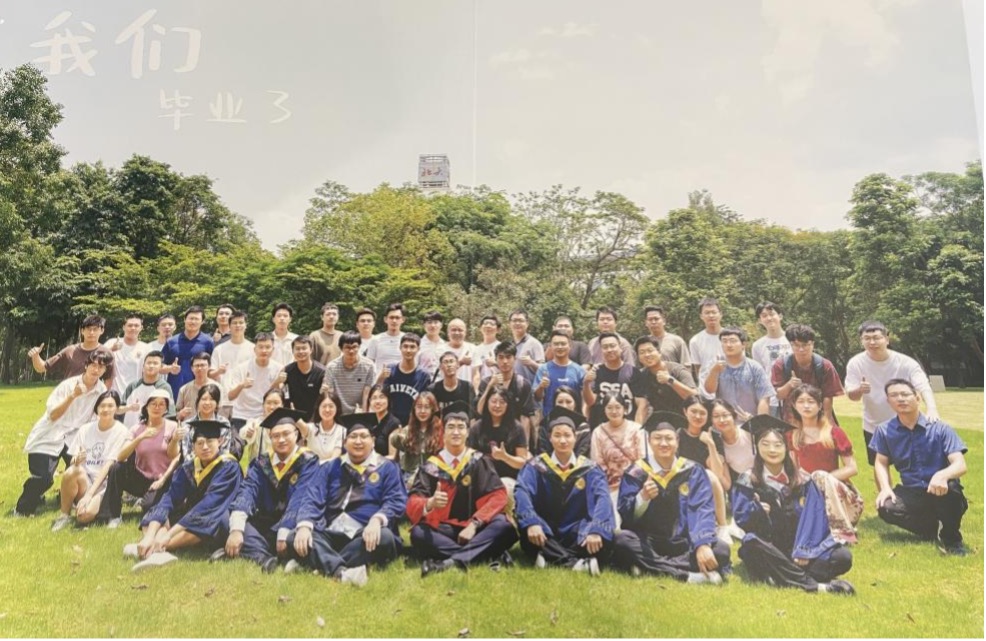
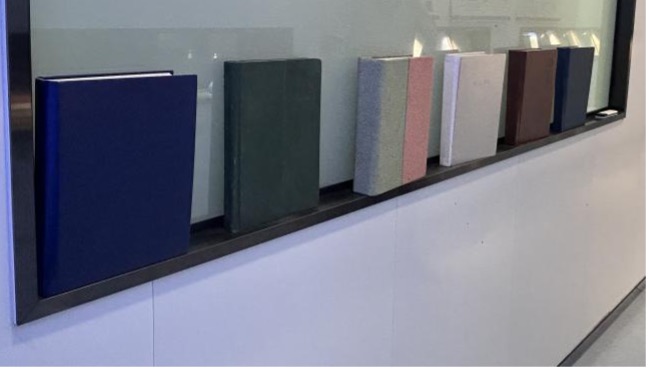
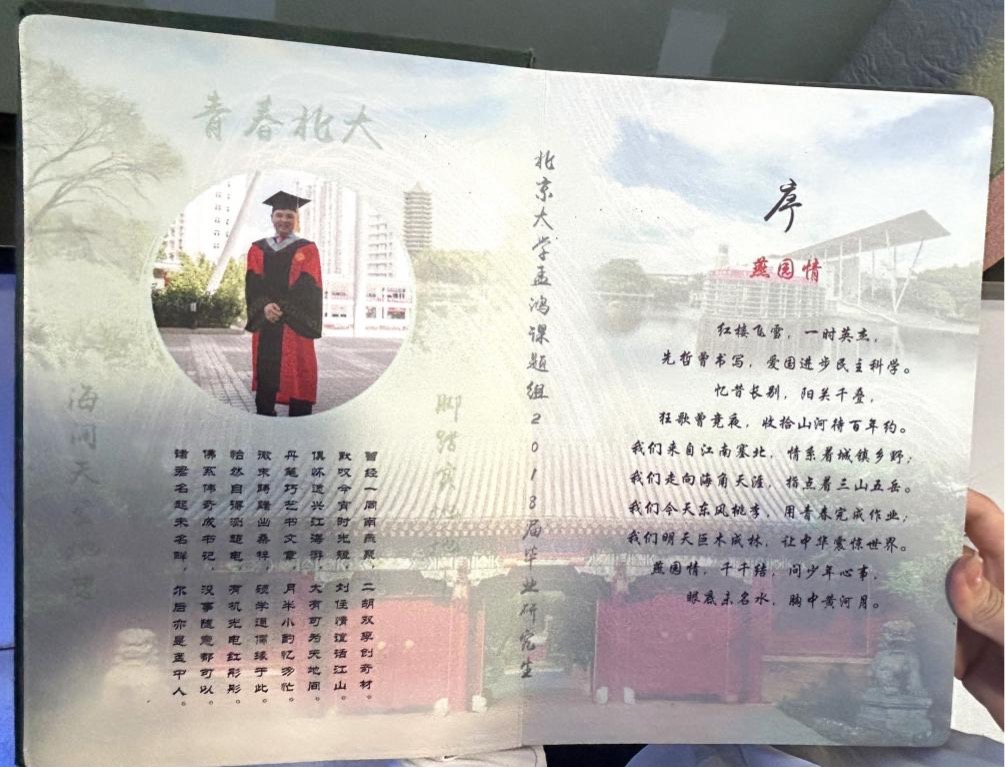
Student Yearbook
“Materials change the world.” Prof. Meng embodies the responsibility and commitment of both an educator and a researcher through his actions. His educational philosophy, teaching methods, and scientific pursuits set a powerful example for us all. Looking into the future, we anticipate that Prof. Meng will continue to play a leading role in education and research, making even greater contributions to advancing China’s new materials field. At the intersection of science and industry, this “sower of wheat” continues to toil diligently—planting not only the bonds between material molecules but also a symphony of reason and warmth in the hearts of young minds.
